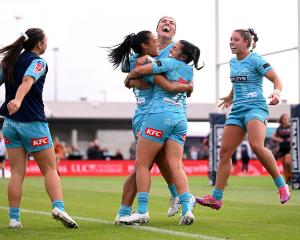It's difficult to ignore the message when almost 98% of rugby fans voted this week for the return of midweek matches on All Black tours.
The poll was taken by specialist rugby television programme Reunion, and, had it been taken after the match against Munster, it is probable the vote would have been 100% in favour.
This was the very essence of rugby as Munster came within three or four minutes of repeating its famous win over the All Blacks at Thomond Park in 1978.
I enjoyed the match as much as any I have watched this year - for its passion, its atmosphere and for the sportsmanship of the wonderful Limerick crowd.
And there was irony at the end when the former All Black Doug Howlett hesitated and gave Joe Rokocoko the space he needed to score the winning try.
What became apparent to me during the match was that this was the ideal breeding ground for fringe All Blacks.
It was more intense than the national championship and the Super 14 but just a notch below decent test level.
The young All Blacks found out much about themselves in Limerick, and the All Black selectors did, too.
In the days before professionalism, some players went on one, two or even three All Black tours but were never awarded a test cap. They were judged to be among the best 30 players in New Zealand but not among the top 15.
The Northland loose forward Bevan Holmes, as one example, played more than 30 games for the All Blacks but never donned a test jersey.
Most All Blacks in this category accepted their lot cheerfully and uncomplainingly. Their job was to play as well as possible in the midweek matches to put pressure on the test XV, and to contribute to maintaining team morale.
There was never any question the midweekers would be promoted to the test team except on merit, for test caps were highly prized.
It's different now. The All Blacks play 15 tests this year and there will probably be as many, if not more, next year. The All Blacks are a revenue-machine.
Which is why it was nice to forget about money and watch a match played simply for the love of the game.
There are, by my estimate, only about 21 players of good All Black test standard in the present touring team and yet they seem almost certain to complete the Grand Slam.
The All Blacks this year have so far won 11 of the 13 tests they have played, a most meritorious record considering they lost so many leading players after the World Cup.
It might also be explained, in part, by a slight drop-off in the standard of test rugby as so many southern hemisphere players throw in their lot with European clubs.
Few of the All Blacks who played against Munster have yet reached All Black test standard, but that is not to say they won't.
It was a magnificent learning experience for them, for the young Southland prop, Jamie Mackintosh, for the Otago flanker, Adam Thomson, and for all the others.
Just as it was said until a few years ago that being part of a lengthy Ranfurly Shield tenure prepared players for the All Blacks, so it is with midweek matches on All Black tours. It's as close to the real thing as it gets.
Some All Blacks get to play as many tests in four or five seasons now as Colin Meads (55) played in the 14 years between 1957 and 1971.
There are four tests, and one midweek match, on the present tour of Britain and Ireland. Some of us would prefer four tour matches and one test, at the end.
That's not going to happen. It wouldn't maximise the revenue-gathering potential. But for an hour and a-half on Wednesday morning in Limerick, it became a trip down memory lane, a return to the way we were.












